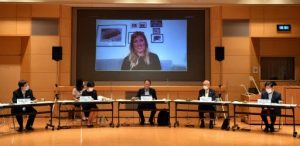Leaders of ruling and opposition parties discuss Japan’s response to TPNW in Hiroshima
Aug. 6, 2020
by Fumiyasu Miyano, Staff Writer
On August 5, the Japan NGO Network for Nuclear Weapons Abolition, which consists of the Japan Confederation of A- and H-Bomb Sufferers Organizations (Nihon Hidankyo) and several peace groups, held a meeting in Naka Ward, Hiroshima, to discuss the matter on the theme of a policy that Japan should take toward the elimination of nuclear weapons. Eleven Diet members including leaders of both the ruling and opposition parties participated in the meeting and exchanged opinions on how Japan will respond to the Treaty on the Prohibition of Nuclear Weapons (TPNW) on which the government continues to turn its back.
Beatrice Fihn, executive director of the International Campaign to Abolish Nuclear Weapons (ICAN), a non-government organization (NGO), who participated in the meeting online, raised a question about Japan’s stance on the nuclear ban treaty, saying, “Japan is being pressed into making a choice. If the country does not join the treaty now, it would be regarded as a ‘shame’ in society.”
In response, Asako Omi, Vice Minister of Japan Foreign Affairs, said, “Your opinion is different from the Japanese government approach. We consider it important to advance the reduction of nuclear weapons step by step,” and explained the conventional government standpoint. Hiroshi Hiraguchi (a representative of the second district of Hiroshima), secretary general of the parliamentarians’ association to promote relief to A-bomb survivors, the abolition of nuclear weapons and the realization of lasting world peace of the Liberal Democratic Party, also said, “We are not opposed to the treaty. However, it is premature to join the treaty now. We should first focus on reducing nuclear weapons.”
To the contrary, the opposition parties mainly showed a positive attitude toward the treaty.
Yukio Edano, leader of the Constitutional Democratic Party of Japan, strongly said, “I would like to discuss the conditions for ratifying the TPNW frankly between the government and opposition parties. The road to join the treaty while maintaining an alliance with the U.S. is not closed” Yuichiro Tamaki, head of the Democratic Party for the People urged the government to refrain from delivering a message that says Japan is against the TPNW. Kazuo Shii, chair of the Japanese Communist Party Executive Committee, vowed that he would like to make utmost efforts in a grassroots campaign to facilitate an entry into force of the treaty.
In an interview after the meeting, Terumi Tanaka, 88, co-representative for the Japan NGO Network and co-chairperson of Nihon Hidankyo, said, “It is the Diet to ratify the treaty. I would like lawmakers to bear this in mind in discussing Japan’s stance on the treaty.”
(Originally published on August 6, 2020)
On August 5, the Japan NGO Network for Nuclear Weapons Abolition, which consists of the Japan Confederation of A- and H-Bomb Sufferers Organizations (Nihon Hidankyo) and several peace groups, held a meeting in Naka Ward, Hiroshima, to discuss the matter on the theme of a policy that Japan should take toward the elimination of nuclear weapons. Eleven Diet members including leaders of both the ruling and opposition parties participated in the meeting and exchanged opinions on how Japan will respond to the Treaty on the Prohibition of Nuclear Weapons (TPNW) on which the government continues to turn its back.
Beatrice Fihn, executive director of the International Campaign to Abolish Nuclear Weapons (ICAN), a non-government organization (NGO), who participated in the meeting online, raised a question about Japan’s stance on the nuclear ban treaty, saying, “Japan is being pressed into making a choice. If the country does not join the treaty now, it would be regarded as a ‘shame’ in society.”
In response, Asako Omi, Vice Minister of Japan Foreign Affairs, said, “Your opinion is different from the Japanese government approach. We consider it important to advance the reduction of nuclear weapons step by step,” and explained the conventional government standpoint. Hiroshi Hiraguchi (a representative of the second district of Hiroshima), secretary general of the parliamentarians’ association to promote relief to A-bomb survivors, the abolition of nuclear weapons and the realization of lasting world peace of the Liberal Democratic Party, also said, “We are not opposed to the treaty. However, it is premature to join the treaty now. We should first focus on reducing nuclear weapons.”
To the contrary, the opposition parties mainly showed a positive attitude toward the treaty.
Yukio Edano, leader of the Constitutional Democratic Party of Japan, strongly said, “I would like to discuss the conditions for ratifying the TPNW frankly between the government and opposition parties. The road to join the treaty while maintaining an alliance with the U.S. is not closed” Yuichiro Tamaki, head of the Democratic Party for the People urged the government to refrain from delivering a message that says Japan is against the TPNW. Kazuo Shii, chair of the Japanese Communist Party Executive Committee, vowed that he would like to make utmost efforts in a grassroots campaign to facilitate an entry into force of the treaty.
In an interview after the meeting, Terumi Tanaka, 88, co-representative for the Japan NGO Network and co-chairperson of Nihon Hidankyo, said, “It is the Diet to ratify the treaty. I would like lawmakers to bear this in mind in discussing Japan’s stance on the treaty.”
(Originally published on August 6, 2020)








